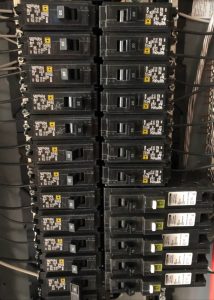 An arc fault refers to a potentially dangerous situation where corroded or loose wiring creates a contact that is intermittent. This intermittent connection causes sparks of the electrical current, best described as an arc between contact points. Often times, you can tell you have an arc fault by a buzzing sound in an electrical outlet or light switch. Sometimes it sounds like hissing. This is the sound of the arcing happening. The arcing generates heat, and this heat breaks down insulation that surrounds the individual wires that are conducting. This provides a potential fire hazard. However, this sound doesn’t mean that a fire is unavoidable. That doesn’t mean it shouldn’t be addressed with haste.
An arc fault refers to a potentially dangerous situation where corroded or loose wiring creates a contact that is intermittent. This intermittent connection causes sparks of the electrical current, best described as an arc between contact points. Often times, you can tell you have an arc fault by a buzzing sound in an electrical outlet or light switch. Sometimes it sounds like hissing. This is the sound of the arcing happening. The arcing generates heat, and this heat breaks down insulation that surrounds the individual wires that are conducting. This provides a potential fire hazard. However, this sound doesn’t mean that a fire is unavoidable. That doesn’t mean it shouldn’t be addressed with haste.
Any device that was designed to protect against this situation is considered arc-fault protection.
Ground faults, short-circuiting, and arc faults are all not the same thing, though they are often confused for being the same. Each is different in prevention as well, requiring different strategies to protect your home and family.
A ground fault is when a short circuit makes unwanted contact with a ground. When the energized current makes contact, it wears down the resistance of circuit wires. This can cause a flow of current that results in the circuit breaker to trip. Though, there are times when the breaker doesn’t react fast enough to avoid shocks.
A short circuit is where hot energized energy begins to stray out of the wiring system that is established. It then makes contact with either the grounding path or neutral wiring. This will cause a sudden increase in volume by lessening the resistance of the current flow. Normally, the circuit will trip to stop this current flow, as the flow will exceed amperage capacity.
Mentioned before, an arc fault is a corroded wire, or loose connection causes sparks (arcing). This will create heat and raise the risk of electrical fires. Also, it could be a warning symptom of either a ground-fault or short-circuit. GFCI and circuit breakers will not guard against arc faults. That is where you need an AFCI circuit breaker or outlet.
What is an AFCI
AFCI stands for arc-fault circuit interrupter. Differing from a GFCI, an AFCI protects against fires. It doesn’t eliminate the possibility, but it greatly reduces it. Normally you require an AFCI circuit breaker to receive the protection needed. However, special AFCI outlets are available as a runner up.
Remodeled or new wiring is required to have both AFCI and GFCI protection. This is accomplished by using circuit breakers that are AFCI and GFCI receptacles at certain locations. You can also have an AFCI/GFCI circuit breaker installed, granting you protection from the entire circuit.
It takes a trained electrician to fix a sensitive arc fault circuit breaker, and Professional Electric has the right people for the task. Based in New Orleans, Professional Electric operates on the accuracy, safety, and skill to fix, install, or service circuit breakers. We will also help you with arc fault protection.